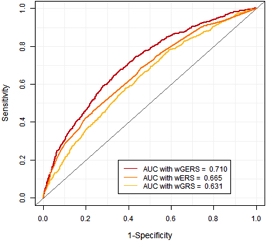Session Information
Date: Tuesday, June 21, 2016
Session Title: Parkinson's disease: Genetics
Session Time: 12:30pm-2:00pm
Location: Exhibit Hall located in Hall B, Level 2
Objective: To assess the potential of Parkinson’s disease (PD) risk prediction using a comprehensive list of genetic and environmental/lifestyle factors associated with PD.
Background: Parkinson’s disease (PD) is a genetically complex disorder that is governed by the effects of genetic variants in concert with environmental factors. Previous studies have pinpointed 26 single-nucleotide polymorphisms (SNPs) as well as several environmental/lifestyle factors that show consistent evidence for association with PD. However, the capability of disease prediction based on the combined effects of these variables has not been systematically assessed to date. At least in part this is due to the paucity of carefully recruited population-based studies of sufficient sample size.
Methods: Twenty-three PD risk SNPs were successfully genotyped in one of the worldwide largest population-based PD datasets comprising 1,526 cases and 1,561 controls from Denmark ("PASIDA"). Pre-disease exposures were available for 13 environmental/lifestyle factors previously associated with PD. Risk prediction analyses were based on i) a genetic risk score weighted by previously reported independent effect estimates (wGRS), ii) an environmental score based on the 13 variables weighted by effect estimates from a recent systematic meta-analysis (wERS), and iii) an integrated score combining both domains (wGERS). In order to account for potential dependencies of the environmental variables, stagewise regression was used to select important predictors from all non-genetic variables.
Results: Prediction analyses yielded an AUC of 0.63 (95% CI 0.61-0.65) for the wGRS. The AUC based on the wERS was comparable. The risk score combining both genetic and environmental factors improved substantially in comparison to the scores based on the single domains (AUC 0.70, 95% CI 0.68-0.72). Interestingly, stagewise regression revealed that six of the 13 non-genetic predictors had slightly better ability to predict disease status than all environmental factors combined (AUC 0.71, 95% CI 0.69-0.73). Figure. PD risk prediction model. 
Conclusions: The combination of both genetic and environmental factors into one risk score improves PD risk prediction over analyses treating factors from each domain separately. However, additional variables need to be identified and included to allow for a more precise and clinically relevant risk prediction.
To cite this abstract in AMA style:
C.M. Lill, Y.H. Chuang, J. Hansen, P.C. Lee, N. Greene, C. Klein, H. Binder, B. Ritz, L. Bertram. Risk prediction modeling in Parkinson’s disease using genetic and environmental/lifestyle factors [abstract]. Mov Disord. 2016; 31 (suppl 2). https://www.mdsabstracts.org/abstract/risk-prediction-modeling-in-parkinsons-disease-using-genetic-and-environmentallifestyle-factors/. Accessed February 7, 2026.« Back to 2016 International Congress
MDS Abstracts - https://www.mdsabstracts.org/abstract/risk-prediction-modeling-in-parkinsons-disease-using-genetic-and-environmentallifestyle-factors/
